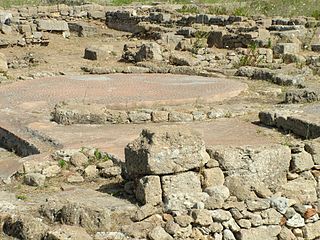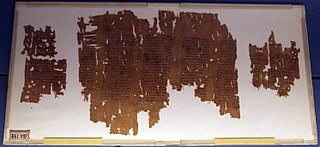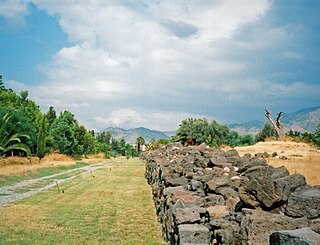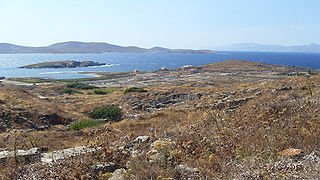
The Peloponnesian War was an ancient Greek war fought between Athens and Sparta and their respective allies for the hegemony of the Greek world. The war remained undecided for a long time, until the decisive intervention of the Persian Empire in support of Sparta. Led by Lysander, the Spartan fleet, built with Persian subsidies, finally defeated Athens and started a period of Spartan hegemony over Greece.

Thucydides was an Athenian historian and general. His History of the Peloponnesian War recounts the fifth-century BC war between Sparta and Athens until the year 411 BC. Thucydides has been dubbed the father of "scientific history" by those who accept his claims to have applied strict standards of impartiality and evidence-gathering and analysis of cause and effect, without reference to intervention by the gods, as outlined in his introduction to his work.

Sparta was a prominent city-state in Laconia in ancient Greece. In antiquity, the city-state was known as Lacedaemon, while the name Sparta referred to its main settlement on the banks of the Eurotas River in Laconia, in south-eastern Peloponnese. Around 650 BC, it rose to become the dominant military land-power in ancient Greece.

Pericles was a Greek politician and general during the Golden Age of Athens. He was prominent and influential in Athenian politics, particularly between the Greco-Persian Wars and the Peloponnesian War, and was acclaimed by Thucydides, a contemporary historian, as "the first citizen of Athens". Pericles turned the Delian League into an Athenian empire and led his countrymen during the first two years of the Peloponnesian War. The period during which he led Athens, roughly from 461 to 429 BC, is sometimes known as the "Age of Pericles", but the period thus denoted can include times as early as the Persian Wars or as late as the following century.

Archidamus II was a king of Sparta who reigned from approximately 469/8 BC to 427/6 BC. His father was Zeuxidamus. Zeuxidamus married and had a son, Archidamus. However, Zeuxidamus died before his father, Leotychidas.

Artabazos was a Persian general in the army of Xerxes I, and later satrap of Hellespontine Phrygia under the Achaemenid dynasty, founder of the Pharnacid dynasty of satraps. He was the son of Pharnaces, who was the younger brother of Hystaspes, father of Darius I. Artabazos was therefore a first cousin of the great Achaemenid ruler Darius I.
Agis II was the 18th Eurypontid king of Sparta, the eldest son of Archidamus II by his first wife, and half-brother of Agesilaus II. He ruled with his Agiad co-monarch Pausanias.

Archelaus I was king of the ancient Greek kingdom of Macedon from 413 to 399 BC. He was a capable and beneficent ruler, known for the sweeping changes he made in state administration, the military, and commerce. By the time that he died, Archelaus had succeeded in converting Macedon into a significantly stronger power. The Ancient Greek Thucydides credited Archelaus with doing more for his kingdom's military infrastructure than all of his predecessors together.

Megara Hyblaea – perhaps identical with Hybla Major – is an ancient Greek colony of Magna Graecia in Sicily, situated near Augusta on the east coast, 20 kilometres (12 mi) north-northwest of Syracuse, Italy, on the deep bay formed by the Xiphonian promontory. There were at least three cities named "Hybla" in ancient accounts of Sicily which are often confounded with each other, and among which it is sometimes very difficult to distinguish.

Hellenica simply means writings on Greek (Hellenic) subjects. Several histories of 4th-century Greece, written in the mould of Thucydides or straying from it, have borne the conventional Latin title Hellenica. The surviving Hellenica is an important work of the Ancient Greek writer Xenophon and one of the principal sources for the last seven years of the Peloponnesian War not covered by Thucydides, as well as the war's aftermath.

Naxos or Naxus was an ancient Greek city of Magna Graecia, presently situated in modern Giardini Naxos near Taormina on the east coast of Sicily.
Aristophon was native of the deme of Azenia in Attica. He lived about and after the end of the Peloponnesian War. In 412 BC, Aristophon, Laespodias, and Melesias were sent to Sparta as ambassadors by the oligarchical government of the Four Hundred.
Thucydides, son of Melesias was a prominent politician of ancient Athens and the leader for a number of years of the powerful conservative faction. While it is likely he is related to the later historian and general Thucydides, son of Olorus, the details are uncertain; maternal grandfather and grandson fits the available evidence.

Inaros (II), also known as Inarus, (fl. ca. 460 BC) was an Egyptian rebel ruler who was the son of an Egyptian prince named Psamtik, presumably of the old Saite line, and grandson of Psamtik III. In 460 BC, he revolted against the Persians with the help of his Athenian allies under Admiral Charitimides, and defeated the Persian army commanded by satrap Achaemenes. The Persians retreated to Memphis, but the Athenians were finally defeated in 454 BC by the Persian army led by Megabyzus, satrap of Syria, and Artabazus, satrap of Phrygia, after a two-year siege. Inaros was captured and carried away to Susa where he was reportedly crucified in 454 BC.

The Wars of the Delian League were a series of campaigns fought between the Delian League of Athens and her allies, and the Achaemenid Empire of Persia. These conflicts represent a continuation of the Greco-Persian Wars, after the Ionian Revolt and the first and second Persian invasions of Greece.
Sirras or Sirrhas was a prince, royal member and perhaps prince-regent of Lynkestis (Lyncestis) in Upper Macedonia for his father-in-law King Arrhabaeus. He participated in the Pelopponesian War against Sparta.
Rhoiteion was an ancient Greek city in the northern Troad region of Anatolia, also known as Ῥοίτιον ἄκρον. Its territory was bounded to the south and west by the Simoeis river and to the east by Ophryneion. It was located on the Baba Kale spur of Çakal Tepe north of Halileli and west of İntepe in Çanakkale Province, Turkey.
Alopece was an asty-deme of the city of Athens, but located exterior to the city wall of Athens. Alopece was situated only eleven or twelve stadia from the city, and not far from Cynosarges. It possessed a temple of Aphrodite, and also apparently one of Hermaphroditus.












